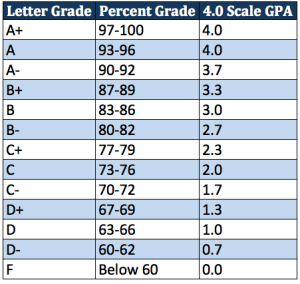On Take Your Success, I regularly interview top-performing college students to understand how they’re successful, so you can recreate the success in your life. Take what’s helpful, dismiss what’s not!
Emma Malueg is not your average college student. She is far from it.
After growing up traveling to different countries and learning different languages, Emma advanced these habits and skills in college. For example, she studies Arabic and recently received the Outstanding Student Award in Arabic for her accomplishments. That’s why I wouldn’t be shocked if she worked for the United Nations someday.
In this interview, you will gain insight on how to expand your cultural awareness through travel, better manage your class schedule, and feel calm during finals week.
Let’s hear from Emma.
——
Brian: What are your two majors? Why did you pick them?
Emma: I started off college as a history major – it had been one of my favorite subjects in high school and seemed like a good fit. My history degree has also helped me strengthen my writing, which has been an added benefit.
Not even a year later, I declared international studies (ITS) as my second major, with a concentration in peace, conflict, and diplomacy. I had somewhat stumbled upon an introductory international studies course, took it to fill a general requirement, and absolutely loved every minute of it. Something, I couldn’t tell you what, clicked. My ITS major is definitely my favorite of the two, but both complement each other very well.
Brian: What is your best advice for handling academic coursework as a double major?
Emma: This is honestly going to sound incredibly corny but if you do what you love, the hard work doesn’t seem all that difficult. I’ve found that I never really minded my course load so long as I was enjoying what I did. This past semester, for example, I started doing research for the History Department’s Undergraduate Honors Research Colloquium as well as took my capstone for the International Studies Department. I won’t deny that it was a lot of work but I thrive in an environment where I am challenged and forced to push my limits.
I guess, in regards to your question, I would have three little tidbits of advice:
One, find something that you’re passionate about. If you hate what you’re doing, especially your major, I can almost guarantee that you’re going to hate yourself. If you’re forced to take a certain class that you dislike, find a way to make it fun. As a history major, I’m often required to take classes on subjects that don’t always fall into my area of interest. In order to amuse myself, I find random factoids that crack me up. It sounds silly, but sometimes just try to enjoy the little things.
Two, know what sort of worker you are and work to your strengths. I’m the type of person who works best under the urgency of a deadline and I tend to write best somewhere between the hours of midnight to four in the morning. Admittedly, it’s not the most efficient way to work, but I’m not the type of person who gets stressed easily so it works for me.
Three, balance is key. Having a double major is tough and finding a way to squeeze in all your required classes can be difficult. Make a game plan and try to plan out not only the current year, but next year as well so you know what classes you need to knock out. I’m horrible at planning things out, but this has certainly helped me. And be sure to work with your advisor, they’re a lot more helpful that you may think.
Brian: Why did you choose to also study Arabic?
Emma: I’m somewhat of a language nerd, honestly. I essentially learned English and French at the same time since my parents enrolled me in a French-speaking academy at the age of three. In high school, wanting to try something new, I took Japanese for three years. Prior to college, I had studied or lived abroad a total of three times: twice in France and once in Japan.
College forced me to reevaluate my choices. I started thinking about how I could use my language skills to find a job. Although French and Japanese are both great languages, they’re not highly marketable or in demand. The big ones are Chinese and Arabic. After agonizing over the Japanese writing systems for most of high school, I wasn’t overly keen on attempting Chinese. So, that left me with Arabic. Plus, I ended up developing a keen interest in extremism, especially religious extremism, my freshman year, so it ended working out.
Arabic has definitively been the hardest language I’ve attempted to learn and I confess that there were many moments when I wanted to quit. I believe that, on the Foreign Service Institute’s (FSI) language ranking scale, Arabic is considered to be a Class III language, meaning that it is one of the most difficult to learn for English speakers. Still, I like a challenge. I’ve finally completed the 300 level Arabic classes and was rewarded with the Outstanding Student Award in Arabic at the end of this semester, which is granted to the top student at each level.
Brian: What countries have you traveled to? What inspires you to travel regularly?
Emma: I am fortunate enough to have been born into a family that places a lot of value on travel, and that has certainly rubbed off on me. I couldn’t imagine my life without this aspect. As mentioned above, I’ve grown up with a sort of “international” mindset and I feel like that has kept me grounded as an individual. Growing up, I’ve been to places like Turkey, Ireland, Austria, Japan, France, Italy, Spain, Albania, Croatia, Macedonia, and last summer I got to study abroad and work in Kosovo, which was probably one of the most eye-opening experiences in my life.
Cultural awareness is something that I believe is important for everyone to have, but so few actually do. People often misunderstand me when I talk about traveling; I don’t mean the sort of mass-produced tourism that a lot of people tend to fall prey to. I’ve encountered numerous people who have traveled a lot, more than myself, but never really took the time to break away from the bubble of tourist-trap cities and attractions. That makes me sad. The beauty about traveling, in my eyes, is that you get to break away from your culture and experience something different. It gives you perspective that can be incredibly humbling at times. Yes, it can be uncomfortable but I find it to be an enlightening experience if you allow it to be one.
Brian: Please share what those who know you best would say you’re elite at. Why?
Emma: I don’t know if I’m really “elite” at anything, to be honest. In my opinion, I’m far too young and inexperienced to even suppose that I’ve reached such expertise at anything in life… And that’s okay. We’re all young. To say that any of us are “elite” would be presumptuous. Instead, I think it’s more important (and healthy) to recognize that we are learning and will always be learning until the day we die.
Brian: What strategy do you use to manage time effectively in college?
Emma: I’m a strategic thinker. It’s true that I’m not very good at planning things out far in advance, which has come back to bite me occasionally. In my opinion, however, planning every little bit of your life out is a tedious waste of time; you’ll be exhausted when you’re done deliberating over it all and will unnecessarily stress yourself out when you inevitably get off track. It’s more effective, at least for me, to focus on a few specific targets.
This is going to sound weird, but I feel like this trait comes from my background as a fencer. I was nationally competitive fencer for about ten years before college, when injuries and lack of time forced me to quit. Still, as any athlete can tell you, sports can change how you think. For fencing, everything is a chess game and you always want to stay two, three, ten steps ahead of your opponent. You single out critical points and you attack them. If there’s enough time left on the clock after, then you go after the little things. If not, don’t stress it.
Most importantly, you need to think fast and always have a backup plan. This mentality has definitively transferred over to both my personal and academic life. In regards to my academic work, I’m very good at singling out what’s important and what’s not, breaking it down, and synthesizing it into manageable bits. As a result, I’ve never had to spend more than a few hours studying, kept my GPA up, and finals season is exponentially easier.
Brian: Tell me your future goals.
Emma: So much to do, so little time. I can honestly see myself doing a lot of things in the future, so I don’t really have a “life plan.” At this point in my life, I don’t want to limit my opportunities or myself by setting my heart on anything in particular. Life is always changing, so I need to be prepared to change with it.
I do admit that one big thing for my vision of my future is that I would like to travel and I think my language skills will allow me to do so. Continuing on to graduate school would be great, too, but I would also like to get some work experience before that.
This past semester has been incredibly influential; my International Studies capstone course required teams to work on creating a plausible policy recommendation on issues in the Middle East. Although incredibly difficult, I really enjoyed this taste of real-world international policy development. As a result, I’ve researched fields that would allow me to work on policy analysis and recommendations. I’ve looked at working for NGOs, both the public and private sectors, IGOs, the UN… I’ll be attending a conference at the International Institute of Higher Studies in Criminal Sciences in Italy in a few weeks, so perhaps more opportunities will present themselves.
Brian: What do you plan on doing after graduation in 2016?
Emma: Once again, I’m not sure. I think that it’s rather obvious by now that I’m not really the “planning” sort. Right now my focus is on making connections and keeping an open mind. More importantly, however, is remembering that adventure is out there!
——
I personally loved this interview. Emma brought many unique and useful perspectives to the college-success conversation.
For one, I want to travel (Who wants to pay for my trip?). But, I want to travel differently, like Emma said, to truly experience the people and culture—no matter if it’s uncomfortable at first.
Her interview made me think of the phrase, “Travel is the only thing you buy that makes you richer.” So, my advise is to proactively jump on opportunities to travel because they are worth it.
Emma also had an awesome comment about succeeding academically and I want to reiterate it. She said she analyzes what’s important (big exams, papers, projects) and focuses on these tasks. Then she spends time on the little things if and only if there is an opportunity.
If you want to decrease stress and increase your performance, I recommend that you do the same. Focus on what really matters, and then if there is extra time you can spend it on the less important activities or assignments. Doing this will give you control of your schedule.
Readers, please comment below on: When’s the last time you traveled? Did Emma inspire you to travel more often, and travel differently? What did you find intriguing in this interview?



